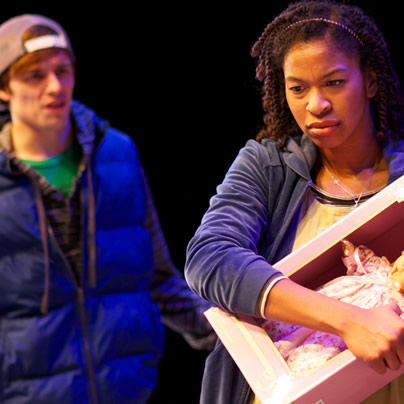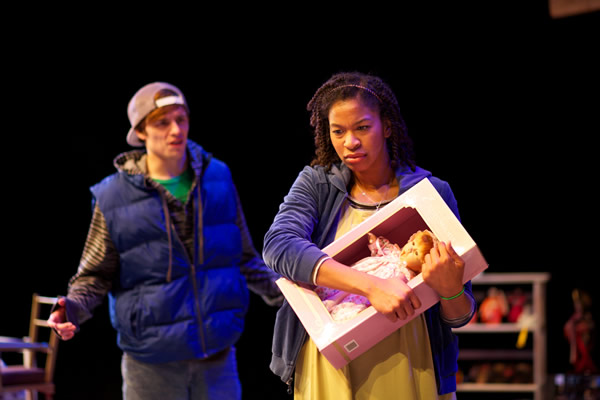Arts & Entertainment
Don’t look in the basement
Odd but endearing play explores pregnant teen’s isolation

‘Holly Down In Heaven’
Through Oct. 20
Forum Theatre
Round House Theatre Silver Spring
8641 Colesville Road, Silver Spring
$15-$25
240-644-1100

Maya Jackson as Holly in Kara Lee Corthron’s ‘Holly Down in Heaven.’ (Photo courtesy Round House Theatre)
Holly keeps counsel with dolls. When you’re a teenager marking time in your basement far from the world, it gets lonely. So she talks to them. And they talk back. Occasionally she even gets some good advice.
Emerging playwright Kara Lee Corthron writes thoughtfully about young women. In her funny and oddly heartwarming “Holly Down In Heaven” (currently making its world premiere at Forum Theatre in a fresh production ably staged by the company’s artistic director Michael Dove), Corthron explores a chaotic childhood journey.
After learning she’s pregnant, 15-year-old honor student Holly (Maya Jackson) sentences herself to nine months downstairs, vowing not to come up again until the baby is born. There, surrounded by her vast doll collection, she waits. Her indulgent widowed father (KenYatta Rogers) however has different ideas. From upstairs he keeps a close eye on his only child, gently encouraging her to consider alternatives to keeping the baby. For born again Christian Holly, abortion is out. She’s adamant: her intention is to remain underground, see no doctors and become a mother.
Tucked away, Holly seeks comfort from her dolls. Displayed on shelves around the perimeter of the open room, they’re arranged singly and in groups. The black contingent headed by a sassy Cabbage Patch baby includes a tiny, diplomatic Kofi Annan; next to them is a ponderously earnest Native American; then there are the Victorian dolls, most notably Queen Victoria herself; and across the basement in a spot lit place of honor stands a graceful Geisha girl (voiced by KyoSin).
Increasingly, conversation between Holly and the dolls centers on their reluctance to share her with a living, breathing baby. Sometimes these talks (actually just Holly talking to herself) become overly heated; and when it does, she quells the mayhem with threats of putting certain dolls in storage or even striking a match. (Like the “Wizard of Oz’s” scarecrow, these chatty collectibles are acutely aware of their flammability.)
For more serious chats, Holly goes one-on-one with her prized psychiatrist doll that bears a resemblance to Carol Channing in appearance and voice. The straight talking, potty-mouthed shrink (expertly handled and hilariously voiced by Vanessa Strickland) encourages her adolescent patient to become less closed off from the humans in her life.
Yes, non-dolls occasionally do make the subterranean scene: In addition to her father, Holly’s tutor Mia (Dawn Thomas), an agreeably neurotic grad student with father issues comes three times a week; and Yager (Parker Drown), the gamer next door pays brief unsolicited visits entering and exiting via a basement window.
Holly is at turns charming and charmless. A bundle of teenage hormones (and pregnant to boot), she is changeable and bratty as she explores notions of independence, relationships and faith. In the title role, Jackson perfectly places her character between little girl and young woman.
As Holly’s inept but well-meaning ex-boyfriend Yager, Drown (who’s gay) gives a terrifically understated performance, securing his growing reputation as a versatile local actor. He’s unrecognizable from his Helen Hayes Award-winning performance as Angel, the drum beating drag queen in Keegan Theatre’s production of “Rent.”
Sometimes the longish “Holly Down In Heaven” doesn’t seem sure what kind of play it is, veering from thoughtful comedy to sticky sitcom, but its general quirkiness make it worth a go.
Photos
PHOTOS: Montgomery County Pride in the Plaza
LGBTQ celebration held in downtown Silver Spring

Montgomery County Pride in the Plaza was held on Sunday, June 29 at Veterans Plaza in Silver Spring, Md.
(Washington Blade photos by Michael Key)























The fifth annual Fredericksburg Pride march and festival was held on Saturday, June 28. A march through the streets of downtown Fredericksburg, Va. was followed by a festival at Riverfront Park.
(Washington Blade photos by Michael Key)



















India
Anaya Bangar challenges ban on trans women in female cricket teams
Former Indian cricketer Sanjay Bangar’s daughter has received support

Anaya Bangar, the daughter of former Indian cricketer Sanjay Bangar, has partnered with the Manchester Metropolitan University Institute of Sport in the U.K. to assess her physiological profile following her gender-affirming surgery and undergoing hormone replacement therapy.
From January to March 2025, the 23-year-old underwent an eight-week research project that measured her glucose levels, oxygen uptake, muscle mass, strength, and endurance after extensive training.
The results, shared via Instagram, revealed her metrics align with those of cisgender female athletes, positioning her as eligible for women’s cricket under current scientific standards. Bangar’s findings challenge the International Cricket Council’s 2023 ban on transgender athletes in women’s cricket, prompting her to call for a science-based dialogue with the Board of Control for Cricket in India and the ICC to reform policies for transgender inclusion.
“I am talking with scientific evidence in my hand,” Bangar said in an interview posted to her Instagram page. “So, I hope, this makes an impact and I will be hoping to BCCI and ICC talking with me and discussing this further.”
On Nov. 21, 2023, the ICC enacted a controversial policy barring trans women from international women’s cricket. Finalized after a board meeting in Ahmedabad, India, the regulation prohibits any trans player who has experienced male puberty from competing, irrespective of gender-affirming surgery or hormone therapy. Developed through a 9-month consultation led by the ICC’s Medical Advisory Committee, the rule aims to safeguard the “integrity, safety, and fairness” of women’s cricket but has drawn criticism for excluding athletes like Canada’s Danielle McGahey, the first trans woman to play internationally. The policy, which allows domestic boards to set their own rules, is slated for review by November 2025.
Bangar shared a document on social media verifying her participation in a physiological study at the Manchester Metropolitan University Institute of Sport, conducted from Jan. 20 to March 3, 2025, focused on cricket performance. The report confirmed that her vital metrics — including haemoglobin, blood glucose, peak power, and mean power — aligned with those of cisgender female athletes. Initially, her fasting blood glucose measured 6.1 mmol/L, slightly above the typical non-diabetic range of 4.0–5.9 mmol/L, but subsequent tests showed it normalized, reinforcing the study’s findings that her physical profile meets female athletic standards.
“I am submitting this to the BCCI and ICC, with full transparency and hope,” said Bangar. “My only intention is to start a conversation based on facts not fear. To build space, not divide it.”
In a letter to the BCCI and the ICC, Bangar emphasized her test results from the Manchester Metropolitan University study. She explained that the research aimed to assess how hormone therapy had influenced her strength, stamina, haemoglobin, glucose levels, and overall performance, benchmarked directly against cisgender female athletic standards.
Bangar’s letter to the BCCI and the ICC clarified the Manchester study was not intended as a political statement but as a catalyst for a science-driven dialogue on fairness and inclusion in cricket. She emphasized the importance of prioritizing empirical data over assumptions to shape equitable policies for trans athletes in the sport.
Bangar urged the BCCI, the world’s most influential cricket authority, to initiate a formal dialogue on trans women’s inclusion in women’s cricket, rooted in medical science, performance metrics, and ethical fairness. She called for the exploration of eligibility pathways based on sport-specific criteria, such as haemoglobin thresholds, testosterone suppression timelines, and standardized performance testing. Additionally, she advocated for collaboration with experts, athletes, and legal advisors to develop policies that balance inclusivity with competitive integrity.
“I am releasing my report and story publicly not for sympathy, but for truth. Because inclusion does not mean ignoring fairness, it means measuring it, transparently and responsibly,” said Bangar in a letter to the BCCI. “I would deeply appreciate the opportunity to meet with you or a representative of the BCCI or ICC to present my findings, discuss possible policy pathways, and work towards a future where every athlete is evaluated based on real data, not outdated perceptions.”
Before her transition, Bangar competed for Islam Gymkhana in Mumbai and Hinckley Cricket Club in the U.K., showcasing her talent in domestic cricket circuits. Her father, Sanjay Bangar, was a dependable all-rounder for the Indian national cricket team from 2001 to 2004, playing 12 test matches and 15 One Day Internationals. He later served as a batting coach for the Indian team from 2014 to 2019, contributing to its strategic development.
Cricket in India is a cultural phenomenon, commanding a fanbase of more than 1 billion, with more than 80 percent of global cricket viewership originating from the country.
The International Cricket Council, the sport’s governing body, oversees 12 full member nations and more than 90 associate members, with the U.S. recently gaining associate member status in 2019 and co-hosting the 2024 ICC Men’s T20 World Cup. The BCCI generated approximately $2.25 billion in revenue in the 2023–24 financial year, primarily from the Indian Premier League, bilateral series, and ICC revenue sharing. The ICC earns over $3 billion from media rights in India alone for the 2024–27 cycle, contributing nearly 90 percent of its global media rights revenue, with the BCCI receiving 38.5 percent of the ICC’s annual earnings, approximately $231 million per year.
Women’s cricket in India enjoys a growing fanbase, with over 300 million viewers for the Women’s Premier League in 2024, making it a significant driver of the sport’s global popularity. The International Cricket Council oversees women’s cricket in 12 full member nations and over 90 associate members, with the U.S. fielding a women’s team since gaining associate status in 2019 and competing in ICC events like the 2024 Women’s T20 World Cup qualifiers. The BCCI invests heavily in women’s cricket, allocating approximately $60 million annually to the WPL and domestic programs in 2024–25, while contributing to the ICC’s $20 million budget for women’s cricket development globally. India’s media market for women’s cricket, including WPL broadcasting rights, generated $120 million in 2024, accounting for over 50 percent of the ICC’s women’s cricket media revenue.
“As a woman, I feel when someone says that they are women, then they are, be trans or cis. A trans woman is definitely the same as a cis woman emotionally and in vitals, and specially, when someone is on hormone replacement therapy. Stopping Anaya Bangar from playing is discrimination and violation of her rights. It is really sad and painful that every transwoman need to fight and prove their identity everywhere,” said Indrani Chakraborty, an LGBTQ rights activist and a mother of a trans woman. “If ICC and BCCI is stopping her from playing for being transgender, then I will say this to be their lack of awareness and of course the social mindsets which deny acceptance.”
Chakraborty told the Blade that Bangar is an asset, no matter what. She said that the women’s cricket team will only benefit by participation, but the discriminating policies are the hindrance.
“Actually the transgender community face such discrimination in every sphere. In spite of being potent, they face rejection. This is highly inhuman. These attitudes is regressive and will never let to prosper. Are we really in 2025?,” said Chakraborty. “We, our mindset and the society are the issues. We, as a whole, need to get aware and have to come together for getting justice for Anaya. If today, we remain silent, the entire community will be oppressed. Proper knowledge of gender issues need to be understood.”
The BCCI and the International Cricket Council have not responded to the Blade’s repeated requests for comment.
-

 U.S. Supreme Court5 days ago
U.S. Supreme Court5 days agoSupreme Court upholds ACA rule that makes PrEP, other preventative care free
-

 U.S. Supreme Court5 days ago
U.S. Supreme Court5 days agoSupreme Court rules parents must have option to opt children out of LGBTQ-specific lessons
-

 Television5 days ago
Television5 days ago‘White Lotus,’ ‘Severance,’ ‘Andor’ lead Dorian TV Awards noms
-

 Music & Concerts5 days ago
Music & Concerts5 days agoBerkshire Choral to commemorate Matthew Shepard’s life












